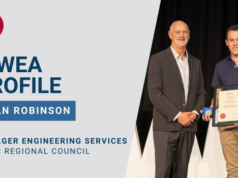By: David Jenkins
The most effective professional education combines rigorous learning, practical training and mentorship to build the capacity of the professional so they can maximise their contribution to their organisation.
Infrastructure and asset management, where so many IPWEA members have their careers, is a particular case in point because it combines different disciplines – such as finance and engineering – and requires strong skills in stakeholder management and also in teamwork.
To build these skills, IPWEA has invested not only in our comprehensive International Infrastructure Financial Management Manual but is using that as the core of a suite of microcredentials which are also highly interactive.
Our Professional Certificate in Infrastructure Financial Management is a 30 to 40 hour online course which delivers much of the content contained in the book, but in a more interactive and engaging way. The course is part of a suite of courses we offer spanning financial and asset management and also governance.
Education and training have different definitions, but are more powerful when they are combined together. And for a practical profession such as engineering, where people deal with the construction and maintenance of physical assets, it can’t work to have one without the other.
This is because professional education is not just about the transfer of knowledge and rote learning, it is most effective when it has a practical dimension to explain the lessons learnt, or comprises contact with peers and experienced professionals.
These are the interactions which build an understanding of real-life situations and case studies, and leverage the knowledge of others to expand the learning experience. Best practice is part of this, but also includes valuable case studies where things may not have gone perfectly, and where there are lessons on how to do it better.
Education might also not the best way to effectively communicate multi-disciplinary concepts. These also need a practical dimension, because to effectively manage the lifecycle of an asset requires a multi-skilled approach with an array of capabilities combining both engineering and finance.
IPWEA believes strongly in lifelong learning and that effective professional educations needs to have an interactive and practical dimension. We want to be able to teach people not just how to build the road, but how to optimise its management over the long term.
So my advice to IPWEA’s developing professionals is to buy the book, either in e-book or print form, because it will be the bedrock of your education and a continual point of reference as you go forward.
And to invest fully in your career, do the online course too because that will give you something extra: that mix of education and training which will stand you in good stead as you develop your capabilities and become more a more effective professional. That will be good for you, our profession, and our community.














